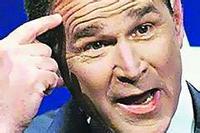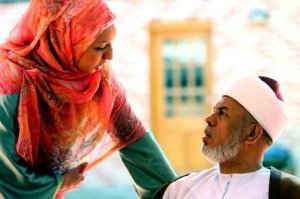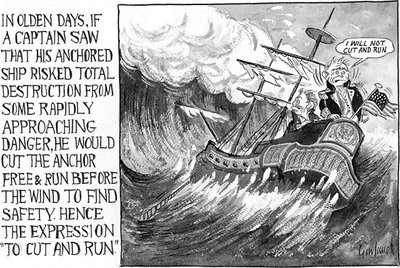I have been off line for a while, after the dial-up connection went down. Up and running now on DSL. Sort of like trading skateboard for a bicycle. But infinitely better than no connection at all. The joys of the outback.
So to some thoughts:
The US hasn’t said Australia will withdraw from Iraq, according to John Howard; or put another way, ‘why bother to waste time on foreign policy when the US can handle it for us?’
New opposition leader Kevin Rudd asked the PM why he was the only world leader who refused to accept the Baker committee’s findings that the current strategies in Iraq were not working.
Howard easily brushed that aside, as a question coming from someone who didn’t want it to work.
All very well, but Howard might not have such an easy run now, against Rudd. His life will become a lot less easy if Bush decides to make any dramatic policy changes. He is extremely exposed in a hopeless situation.
Just to add to any discomfort Howard might be feeling (no guarantees there!) we have revelations of another dodgy terrorist plot. When a package containing an unidentified white powered landed in our Indonesian embassy, in June last year, Howard and his Foreign Minister Downer ranted and raged about a ‘biological agent’ and ‘murderous criminality’. What they didn’t do was amend that rant when the powder now revealed to be ordinary flour.
The Howard government has notched up a string of these knee jerk panic attacks which are much later revealed as a sham. Up until now people have tended to shrug their shoulders and ignore the exaggerations.
Of course, I still contend voter reaction falls back to economic fundamentals, but Kevin Rudd might just be the man to take the spin off Howard’s ball.
Rudd is a bit of a rarity in Australian politics, a leader with a philosophical underpinning. He is styled a Socialist Democrat, among other left leaning titles, bringing a broad social agenda to the role, but he remains fiscally conservative.
Even so, the more general trend is to opportunist and poll chasing leadership. The latter, under Howard, has been elevated to an art form, with the ability to understanding just which elements of the polls or public opinion translate to votes.
Rudd’s predecessor, Beazley followed the Howard line, though obviously with less success. The basic principle is to avoid confusing voters with ideas, just select the relevant public opinion issues and run with them.
The new man is talking ideas, philosophies, and he is striking a chord. I wouldn’t suggest the average voter has suddenly become a discerning and critical thinker, but there are ample historical precedents and perceptions to pin to Rudd.
But Rudd is also focusing on those perennially important perceptions like maintaining good US/Australian relations.
Given an unambiguous opposition to the Iraq involvement, the idea of courting the US might seem problematic. Well, it might have before the Democrats took control of congress. Rudd should find plenty of allies in Washington now, even if they aren’t in the White House.
Rudd also led the opposition censures over the AWB Oil for Food fiasco, and efforts to tie it to Howard’s government. That should also create a few natural allies in Washington as corruption investigations get underway in the new year.
All in all, it is a fairly exciting time to be in Australia, politically at least. The baseline economics are marginal, and confused by some creative accounting methods. Rudd’s thrust might well introduce a different set of aspirations into the electoral equation, raising the bar for Howard and tilting those measurements in Labor’s favour.
I’ve resisted commenting on the Fiji coup, preferring the Australian Labor Party (ALP) coup for the fact that it offers some sort of positive outcome.
The Fijian’s seem destined to limp from one disaster to the next, this being the fourth coup over twenty years and most likely to result in even greater social destabilization for the small island nation.
On the other hand the move on the ALP leadership should, we hope, overcome their tendency to dice with disaster. Deposed leader, Kim Beazley, unfortunately took on the mantle of loser. In some ways he was the essential seat warmer, safe and predictable.
Beazley might well have taken the ALP into government, the economic conditions being right, but he seemed far too cautious to actually take the country anywhere.
New leader, Kevin Rudd, is a thoughtful sort of character, but appears to have a deep resolve to make the sort of changes the country now needs. He even appears to have the balls to drag the various party factions with him.
There have been some strange observations so far. Political journalists have commented that he is full of the right phrases, but not strong on policy directions. Treasurer, Peter Costello, says Rudd is "shallow in economic policy".
The former diplomat is best known as shadow foreign minister and ALP attack dog on the AWB oil for food scandal.
It is a bit rough to attack lack of policy pronouncements so soon, particularly as he says the party policies are in good shape and just need to be driven more effectively. My only misgivings, and I have commented before on the issue, is he infusion of some sort of ‘Christian’ agenda. Rudd is described as a Christian socialist, which sounds like a redundancy anyway, but this is a pluralist society and he won’t serve the country with a narrow religious agenda.
To the economic credentials, I expect Rudd will be quick to pick up on the essentials there. He’s no fool. No doubt the ‘neo-liberal’ economic paradigm will stay in place under Rudd, which is fine so long as he couples that to a social agenda.
My guess is that he will. He has already made noises about dismantling Howard’s US style IR policies. Many Australians would like to see the trade union influence on the ALP weakened, and Rudd is one of the few party leaders who doesn’t come out of the union hierarchy.
Rudd presents well to the media, he’s thoughtful and articulate. That he managed to reach the top without spilling any blood is a great sign for this normally hard ball party.
Whether he can translate all of this into his elevation to Prime Minister depends largely on the country’s key economic indicators. But one thing seems clear;
 Satellites have been used to map all of
Satellites have been used to map all of  alternative crops or even specially developed ‘dry area’ cotton. They are fixed on their own vision of profit maximisation and have invested heavily in it. They are hardly likely to turn around and rethink their business plan, or care about the water needs of the rest of the country. They have the license; but they don’t have the water. (The picture shows the last puddle left in a massive farm dam.)
alternative crops or even specially developed ‘dry area’ cotton. They are fixed on their own vision of profit maximisation and have invested heavily in it. They are hardly likely to turn around and rethink their business plan, or care about the water needs of the rest of the country. They have the license; but they don’t have the water. (The picture shows the last puddle left in a massive farm dam.)








